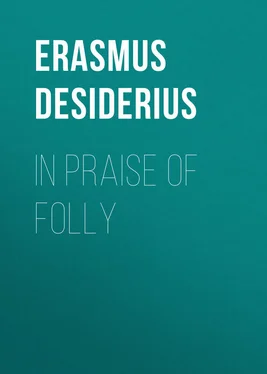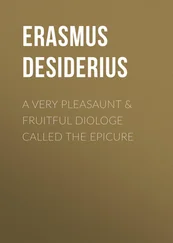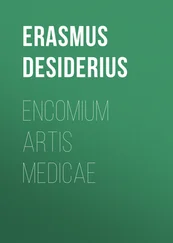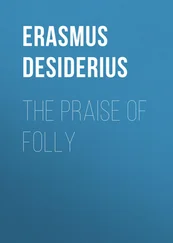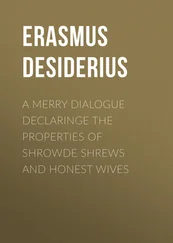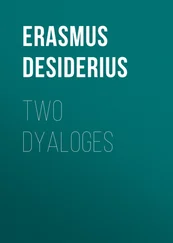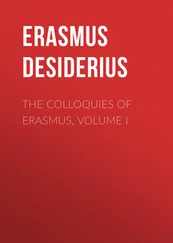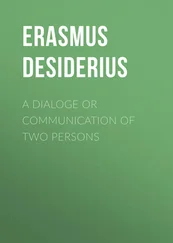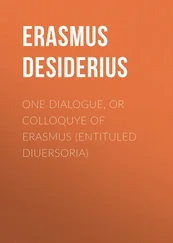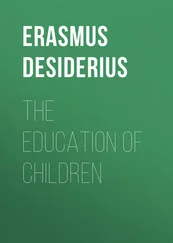Desiderius Erasmus - In Praise of Folly
Здесь есть возможность читать онлайн «Desiderius Erasmus - In Praise of Folly» — ознакомительный отрывок электронной книги совершенно бесплатно, а после прочтения отрывка купить полную версию. В некоторых случаях можно слушать аудио, скачать через торрент в формате fb2 и присутствует краткое содержание. Жанр: foreign_antique, foreign_prose, на английском языке. Описание произведения, (предисловие) а так же отзывы посетителей доступны на портале библиотеки ЛибКат.
- Название:In Praise of Folly
- Автор:
- Жанр:
- Год:неизвестен
- ISBN:нет данных
- Рейтинг книги:4 / 5. Голосов: 1
-
Избранное:Добавить в избранное
- Отзывы:
-
Ваша оценка:
- 80
- 1
- 2
- 3
- 4
- 5
In Praise of Folly: краткое содержание, описание и аннотация
Предлагаем к чтению аннотацию, описание, краткое содержание или предисловие (зависит от того, что написал сам автор книги «In Praise of Folly»). Если вы не нашли необходимую информацию о книге — напишите в комментариях, мы постараемся отыскать её.
In Praise of Folly — читать онлайн ознакомительный отрывок
Ниже представлен текст книги, разбитый по страницам. Система сохранения места последней прочитанной страницы, позволяет с удобством читать онлайн бесплатно книгу «In Praise of Folly», без необходимости каждый раз заново искать на чём Вы остановились. Поставьте закладку, и сможете в любой момент перейти на страницу, на которой закончили чтение.
Интервал:
Закладка:
Now the beastly Priapus may recreate himself without contradiction in lust and filthiness; now the sly Mercury may, without discovery, go on in his thieveries, and nimble-fingered juggles; the sooty Vulcan may now renew his wonted custom of making the other gods laugh by his hopping so limpingly, and coming off with so many dry jokes, and biting repartees. Silenus, the old doting lover, to shew his activity, may now dance a frisking jig, and the nymphs be at the same sport naked. The goatish satyrs may make up a merry ball, and Pan, the blind harper may put up his bagpipes, and sing bawdy catches, to which the gods, especially when they are almost drunk, shall give a most profound attention. But why would I any farther rip open and expose the weakness of the gods, a weakness so childish and absurd, that no man can at the same time keep his countenance, and make a relation of it? Now therefore, like Homer's wandering muse, I will take my leave of heaven, and come down again here below, where we shall find nothing happy, nay, nothing tolerable, without my presence and assistance. And in the first place consider how providently nature has took care that in all her works there should be some piquant smack and relish of Folly: for since the Stoics define wisdom to be conducted by reason, and folly nothing else but the being hurried by passion, lest our life should otherwise have been too dull and inactive, that creator, who out of clay first tempered and made us up, put into the composition of our humanity more than a pound of passions to an ounce of reason; and reason he confined within the narrow cells of the brain, whereas he left passions the whole body to range in. Farther, he set up two sturdy champions to stand perpetually on the guard, that reason might make no assault, surprise, nor in-road: anger, which keeps its station in the fortress of the heart; and Just, which like the signs Virgo and Scorpio, rules the belly and secret members. Against the forces of these two warriors how unable is reason to bear up and withstand, every day's experience does abundantly witness; while let reason be never so importunate in urging and reinforcing her admonitions to virtue, yet the passions bear all before them, and by the least offer of curb or restraint grow but more imperious, till reason itself, for quietness sake, is forced to desist from all further remonstrance.
But because it seemed expedient that man, who was born for the transaction of business, should have so much wisdom as should fit and capacitate him for the discharge of his duty herein, and yet lest such a measure as is requisite for this purpose might prove too dangerous and fatal, I was advised with for an antidote, who prescribed this infallible receipt of taking a wife, a creature so harmless and silly, and yet so useful and convenient, as might mollify and make pliable the stiffness and morose humour of man. Now that which made Plato doubt under what genus to rank woman, whether among brutes or rational creatures, was only meant to denote the extreme stupidness and Folly of that sex, a sex so unalterably simple, that for any of them to thrust forward, and reach at the name of wise, is but to make themselves the more remarkable fools, such an endeavour, being but a swimming against the stream, nay, the turning the course of nature, the bare attempting whereof is as extravagant as the effecting of it is impossible: for as it is a trite proverb, That an ape will be an ape, though clad in purple ; so a woman will be a woman, a fool, whatever disguise she takes up. And yet there is no reason women should take it amiss to be thus charged; for if they do but righdy consider they will find it is to Folly they are beholden for those endowments, wherein they so far surpass and excel man; as first, for their unparalleled beauty, by the charm whereof they tyrannize over the greatest tyrants; for what is it but too great a smatch of wisdom that makes men so tawny and thick-skinned, so rough and prickly-bearded, like an emblem of winter or old age, while women have such dainty smooth cheeks, such a low gende voice, and so pure a complexion, as if nature had drawn them for a standing pattern of all symmetry and comeliness? Beside, what live, but to be wound up as it were in a winding-sheet before we are dead, and so to be shuffled quick into a grave, and buried alive.
But there are yet others perhaps that have no gust in this sort of pleasure, but place their greatest content in the enjoyment of friends, telling us that true friendship is to be preferred before all other acquirements; that it is a thing so useful and necessary, as the very elements could not long subsist without a natural combination; so pleasant that it affords as warm an influence as the sun itself; so honest, (if honesty in this case deserve any consideration), that the very philosophers have not stuck to place this as one among the rest of their different sentiments of the chiefest good. But what if I make it appear that I also am the main spring and original of this endearment? Yes, I can easily demonstrate it, and that not by crabbed syllogisms, or a crooked and unintelligible way of arguing, but can make it (as the proverb goes) As plain as the nose on your face . Well then, to scratch and curry one another, to wink at a friend's faults; nay, to cry up some failings for virtuous and commendable, is not this the next door to the being a fool? When one looking stedfastly in his mistress's face, admires a mole as much as a beauty spot; when another swears his lady's stinking breath is a most redolent perfume; and at another time the fond parent hugs the squint-eyed child, and pretends it is rather a becoming glance and winning aspect than any blemish of the eye-sight, what is all this but the very height of Folly?
Folly (I say) that both makes friends and keeps them so. I speak of mortal men only, among whom there are none but have some small faults; he is most happy that has fewest. If we pass to the gods, we shall find that they have so much of wisdom, as they have very little of friendship; nay, nothing of that which is true and hearty. The reason why men make a greater improvement in this virtue, is only because they are more credulous and easy natured; for friends must be of the same humour and inclinations too, or else the league of amity, though made with never so many protestations, will be soon broke. Thus grave and morose men seldom prove fast friends; they are too captious and censorious, and will not bear with one another's infirmities; they are as eagle sighted as may be in the espial of others' faults, while they wink upon themselves, and never mind the beam in their own eyes. In short, man being by nature so prone to frailties, so humoursome and cross-grained, and guilty of so many slips and miscarriages, there could be no firm friendship contracted, except there be such an allowance made for each other's defaults, which the Greeks term 'Eunoeia , and we may construe good nature, which is but another word for Folly. And what? Is not Cupid, that first father of all relation, is not he stark blind, that as he cannot himself distinguish of colours, so he would make us as mope-eyed in judging falsely of all love concerns, and wheedle us into a thinking that we are always in the right? Thus every Jack sticks to his own Jill; every tinker esteems his own trull; and the hob-nailed suiter prefers Joan the milk-maid before any of my lady's daughters. These things are true, and are ordinarily laughed at, and yet, however ridiculous they seem, it is hence only that all societies receive their cement and consolidation.
The same which has been said of friendship is much more applicable to a state of marriage, which is but the highest advance and improvement of friendship in the closest bond of union. Good God! What frequent divorces, or worse mischief, would oft sadly happen, except man and wife, were so discreet as to pass over light occasions of quarrel with laughing, jesting, dissembling, and such like playing the fool? Nay, how few matches would go forward, if the hasty lover did but first know how many little tricks of lust and wantonness (and perhaps more gross failings) his coy and seemingly bashful mistress had oft before been guilty of? And how fewer marriages, when consummated, would continue happy, if the husband were not either sottishly insensible of, or did not purposely wink at and pass over the lightness and forwardness of his good-natured wife? This peace and quietness is owing to my management, for there would otherwise be continual jars, and broils, and mad doings, if want of wit only did not at the same time make a contented cuckold and a still house; if the cuckoo sing at the back door, the unthinking cornute takes no notice of the unlucky omen of others' eggs being laid in his own nest, but laughs it over, kisses his dear spouse, and all is well. And indeed it is much better patiently to be such a hen-pecked frigot, than always to be wracked and tortured with the grating surmises of suspicion and jealousy. In fine, there is no one society, no one relation men stand in, would be comfortable, or indeed tolerable, without my assistance; there could be no right understanding betwixt prince and people, lord and servant, tutor and pupil, friend and friend, man and wife, buyer and seller, or any persons however otherwise related, if they did not cowardly put up small abuses, sneakingly cringe and submit, or after all fawningly scratch and flatter each other. This you will say is much, but you shall yet hear what is more; tell me then, can any one love another that first hates himself? Is it likely any one should agree with a friend that is first fallen out with his own judgment? Or is it probable he should be any way pleasing to another, who is a perpetual plague and trouble to himself? This is such a paradox that none can be so mad as to maintain. Well, but if I am excluded and barred out, every man would be so far from being able to bear with others, that he would be burthensome to himself, and consequently incapable of any ease or satisfaction. Nature, that toward some of her products plays the step-mother rather than the indulgent parent, has endowed some men with that unhappy peevishness of disposition, as to nauseate and dislike whatever is their own, and much admire what belongs to other persons, so as they cannot in any wise enjoy what their birth or fortunes have bestowed upon them: for what grace is there in the greatest beauty, if it be always clouded with frowns and sulliness? Or what vigour in youth, if it be harassed with a pettish, dogged, waspish, ill humour? None, sure. Nor indeed can there be any creditable acquirement of ourselves in any one station of life, but we should sink without rescue into misery and despair, if we were not buoyed up and supported by self-love, which is but the elder sister (as it were) of Folly, and her own constant friend and assistant For what is or can be more silly than to be lovers and admirers of ourselves? And yet if it were not so there will be no relish to any of our words or actions. Take away this one property of a fool, and the orator shall become as dumb and silent as the pulpit he stands in; the musician shall hang up his untouched instruments on the wall; the completest actors shall be hissed off the stage; the poet shall be burlesqued with his own doggrel rhymes; the painter shall himself vanish into an imaginary landscape; and the physician shall want food more than his patients do physic. In short, without self-love, instead of beautiful, you shall think yourself an old beldam of fourscore; instead of youthful, you shall seem just dropping into the grave; instead of eloquent, a mere stammerer; and in lieu of gende and complaisant, you shall appear like a downright country clown; it being so necessary that every one should think well of himself before he can expect the good opinion of others. Finally, when it is the main and essential part of happiness to desire to be no other than what we already are; this expedient is again wholly owing to self-love, which so flushes men with a good conceit of their own, that no one repents of his shape, of his wit, of his education, or of his country; so as the dirty half-drowned Hollander would not remove into the pleasant plains of Italy, the rude Thracian would not change his boggy soil for the best seat in Athens, nor the brutish Scythian quit his thorny deserts to become an inhabitant of the Fortunate Islands. And oh the incomparable contrivance of nature, who has ordered all things in so even a method that wherever she has been less bountiful in her gifts, there she makes it up with a larger dose of self-love, which supplies the former defects, and makes all even. To enlarge farther, I may well presume to aver, that there are no considerable exploits performed, no useful arts invented, but what I am the respective author and manager of: as first, what is more lofty and heroical than war? and yet, what is more foolish than for some petty, trivial affront, to take such a revenge as both sides shall be sure to be losers, and where the quarrel must be decided at the price of so many limbs and lives? And when they come to an engagement, what service can be done by such pale-faced students, as by drudging at the oars of wisdom, have spent all their strength and activity? No, the only use is of blunt sturdy fellows that have little of wit, and so the more of resolution: except you would make a soldier of such another Demosthenes as threw down his arms when he came within sight of the enemy, and lost that credit in the camp which he gained in the pulpit.
Читать дальшеИнтервал:
Закладка:
Похожие книги на «In Praise of Folly»
Представляем Вашему вниманию похожие книги на «In Praise of Folly» списком для выбора. Мы отобрали схожую по названию и смыслу литературу в надежде предоставить читателям больше вариантов отыскать новые, интересные, ещё непрочитанные произведения.
Обсуждение, отзывы о книге «In Praise of Folly» и просто собственные мнения читателей. Оставьте ваши комментарии, напишите, что Вы думаете о произведении, его смысле или главных героях. Укажите что конкретно понравилось, а что нет, и почему Вы так считаете.
